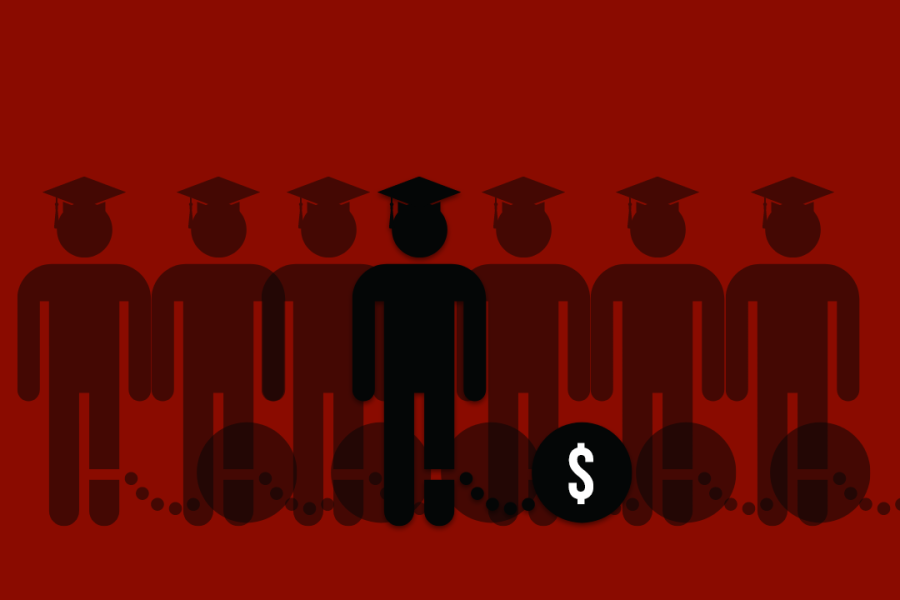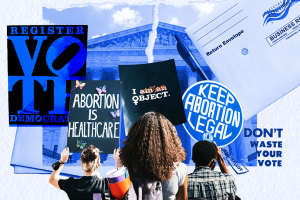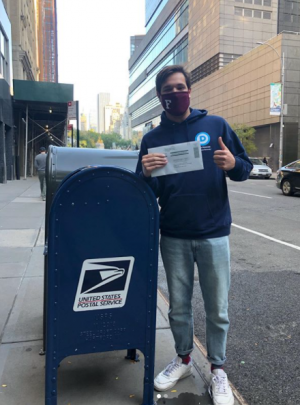Federal Student Debt Forgiveness Is a Drop in the Bucket
Although Biden’s plan is a good start, it isn’t enough to resolve the trillion-dollar student loan crisis
September 28, 2022
Many Americans are unfortunately all too familiar with student debt. U.S. President Joe Biden passed an executive order on Aug. 24 that provides student loan forgiveness to a number of those Americans. Most notably, it forgives up to $10,000 in federal student loans for students meeting a certain income threshold and up to $20,000 in loan forgiveness for Pell Grant recipients. The Biden administration is also spearheading an income-based debt repayment plan so that future borrowers’ loan balances will not grow.
The student debt relief plan will help millions, but some wonder: Why stop at $10,000? Why not forgive all student debt? Forty-five million Americans owe student debt, but only about 14 million will have their debt completely eliminated by the plan. While loan forgiveness still helps federal loan borrowers, 31 million Americans will still struggle to pay off their loans despite this decision. It really only provides a Band-Aid solution for student debt. Biden’s plan does not address the underlying issues with loans, so in a few years America will accumulate the same amount of nationwide student debt.
Any student loan forgiveness at all is surely a good thing, so why am I complaining? Because Biden absolutely has the capacity to eliminate more debt. This plan gives us just a crumb of hope that the government actually can help, sometimes.
Government assistance can improve the well-being of many. For example, stimulus checks during the COVID-19 pandemic averted extreme poverty for many people and prevented what was sure to be a major economic disaster. Free COVID-19 vaccines gave us the tiniest glimpse of an America with universal health care. And now, Americans are being relieved of some of their crushing student loans, but I believe that students should not have to take on massive amounts of debt in order to receive higher education in the first place.
There was a time where some colleges in the U.S. did not charge tuition, and if they did, the costs were a fraction of what they are today. Back in the 1970s, one notable university with free tuition for residents was the University of California. Ronald Reagan cut the state’s education budget when he became governor, which some have suggested was because he was interested in punishing student protesters. Today, the university costs approximately $14,000 per year for in-state students and $44,000 for out-of-state students.
Excessive student debt has effectively created a debtors’ economy that produces servile workers who must work not only in order to support themselves but also to one day pay back their loans. In order to become a productive part of the workforce, you have to take on a large debt, even more so if you are less class-privileged than others. Many have to take on any available minimum-wage job just to survive.
American politics are so backward that when politicians actually do something good, it’s somehow a bad thing. They buy votes from corporations and the wealthy every day, so why not entice actual voters?
Since student debt is so embedded in U.S. society, it makes sense to attempt to help the situation by forgiving the loans. However, there is often opposition to this idea when it is proposed. Criticism has come from conservatives and liberals alike, usually along the lines of “What about the deficit?” or “How will we pay for this?”
To them I say: Since when do Americans care about the national deficit? Biden’s proposed budget for 2023 requests $813.3 billion for national defense. America spends more on the military than the next nine top military-spending countries combined. Neither political party, nor the media, bats an eye at our ever-increasing military spending.
No Republican politicians (and very few Democrat politicians) ever whine about the deficit when it comes to tax cuts for the wealthy, business bailouts or any government action in their own interest.
Besides the common deficit talking point, there is always the good old American value of refusing “handouts.” Many opposing Biden’s actions call this “a bribe for votes.” But aren’t politicians supposed to try and win elections by using popular legislation? American politics are so backward that when politicians actually do something good, it’s somehow a bad thing. They buy votes from corporations and the wealthy every day, so why not entice actual voters?
Republican Senator Mitt Romney of Utah is one of the opponents calling debt forgiveness a bribe. He even posted a tweet summarizing his lack of empathy on the subject: “Other bribe suggestions: forgive auto loans? Forgive credit card debt? Forgive mortgages? And put a wealth tax on the super rich to pay for it all.” Call me crazy, but I personally think he might be onto something.
It is always seen as a problem if the U.S. is providing relief to the working class, but never a problem if the risk mitigation of corporations is funded by taxpayers in the form of bailout packages. It wasn’t a problem for the businesses who received Paycheck Protection Program (PPP) loans but still laid off employees. Don’t forget all of the politicians and right-wing media companies who eagerly took the loans but continue to advocate against them on their broadcasts.
The issue here is not an inability to forgive loans. The government has money. The problem is that sentiments like Ronald Reagan’s famous quote, “The top 9 most terrifying words in the English Language are: I’m from the government, and I’m here to help,” have irreparably broken the brains of Americans.
Only in America would government aid and social safety nets be seen as negative and “terrifying” things. Americans collectively have $195 billion in medical debt as of 2019, while many other comparable countries across the world have some form of universal health care, as well as other social programs. Instead of charging students for an education, countries such as Finland go as far as paying citizens to attend universities.
Education at every level should be accessible for all, not only the wealthy and privileged.
The U.S. has prospered when it has passed economically progressive education bills. For example, education became more accessible to millions in 1944 because of the G.I. Bill, the benefits of which have reverberated throughout society. By allowing students to graduate with minimal or no debt, the G.I. Bill sets those students up for new levels of success, especially with regard to home ownership. Through programs like these, the government can help develop a productive and stable labor force in America.
Education at every level should be accessible for all, not only the wealthy and privileged. Having a better educated workforce would allow us to better compete in the world economy. However, in order to do this, public colleges and universities need to be tuition free. In the meantime, all student debt should be forgiven. Everyone who wants to pursue higher education should be able to receive it without going thousands of dollars into debt.
Many expect the Democratic Party to fight in favor of student loan forgiveness, but the party knows that it can coast on its current platform of not being the Republican Party. They don’t have to deliver on promises so long as Republicans don’t make things worse (which they continue to do anyway).
We have to create mechanisms of pushback to let the Democratic Party know that rights and aid are not just talking points for elections.
We are told to “just vote” as if that helped with saving Roe v. Wade. Now, instead of attempting to get some abortion rights back through Congress, Democrats just send out emails to raise funds for their campaigns. We can’t expect the party to take action on student loan forgiveness and free public education as long as the status quo remains.
We have to create mechanisms of pushback to let the Democratic Party know that rights and aid are not just talking points for elections. Organize your workplace, plan protests, go canvassing for local leaders who truly want change, or simply talk to other people. Spread your ideas. Make concepts such as eliminating debt more palatable for the average American. Ultimately, these mechanisms of pushback start with us.
While Biden’s student loan forgiveness plan may have helped start a revolution in higher education, it is our job to finish it.














Diana Berrio • Oct 18, 2022 at 2:06 pm
Very impressive!! Great article.
scf • Oct 4, 2022 at 9:53 am
well said. thank you.